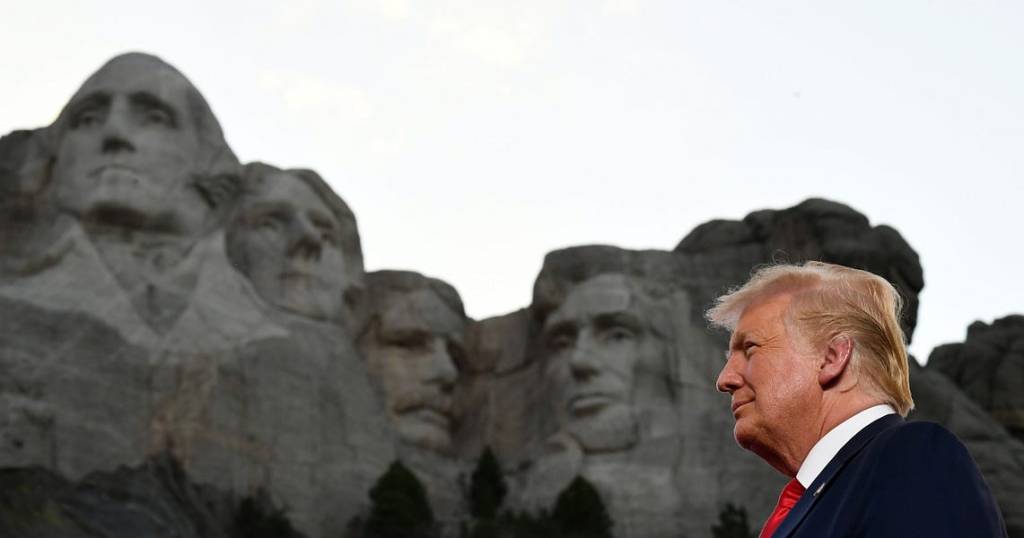I didn’t watch President Trump’s weekend speeches live. It was a holiday, so I chose to take one. As a result, I first learned about them from the reactions they elicited. As usual, it was like Rashomon for the Trump era.
According to the Washington Post, Trump’s Mount Rushmore speech signaled his “unyielding push to preserve Confederate symbols and the legacy of white domination,” which was “crystallized by his harsh denunciation of the racial justice movement.” The Associated Press account was headlined, “Trump pushes racial division, flouts virus rules at Rushmore.” Sen. Tammy Duckworth (D-Ill.) said on CNN that Trump “spent all his time talking about dead traitors.”
Many on the right had a field day in response to the responses. To their ears, Trump didn’t spend any time talking about “dead traitors” or the Confederacy. His subjects were the American Revolution, abolition, and great Americans, including some African Americans. My friend and former National Review colleague Rich Lowry saw and heard “a superb speech, tough but appropriately so.”
I can see how Lowry, who has a greater tolerance for nationalist rhetoric and strained teleprompter reading than I do, heard a good speech—though “superb” is a hernia-risking heavy lift for me. I will concede that, once I caught up to the speeches, I found little that was objectionable in the portions that were purely historical.
So why did I dislike both spectacles so intensely?
Because Trump. The man has a thumbless grasp of history and the requirements of his job. Whenever he opines about such matters, it’s difficult to take any of his sentiments at face value. For Trump, words like “principles,” “liberty,” etc. are merely partisan weapons and code words for attacking Democrats and rallying his most ardent supporters.
That context explains some of the negative reactions. Everyone knows Trump has talked of Confederate symbols as an indivisible part of the American story. So when he blanketly defended “our heritage” at Mount Rushmore without any indication that some of it doesn’t merit much defending (especially from the head of the party of Lincoln), you can understand why some would hear a defense of “dead traitors.”
Similarly, both of his Fourth of July speeches were explicitly campaign events, dedicated to his effort to make the election a binary choice between real patriots and “bad, evil people.”
And yet the yawning gap between what Duckworth and Lowry heard over the weekend goes deeper than that. It’s evidence that the presidency has become the central totem in our culture war.
The trend began before 2016. People who decried Trump’s campaign talk of “taking back our country” forget that this was a standard talking point of Democrats under George W. Bush. Our politics are like the battle between Catholics and Protestants over control of the English throne. The mere thought of “the other” in the Oval Office feels sacrilegious.
In this climate, if one side embraces an idea, the other recoils from it. It’s bad enough when this dynamic infects (and blocks) public policy. But when the Declaration of Independence, the founding and even Abraham Lincoln become cudgels in a partisanship-infected culture war, it’s much more dismaying.
In England, the monarch is the head of state but not the head of government. This distinction allows the monarchy to stay above the partisan fray and be a relatively uniting institution for the country. In the U.S., presidents play it by ear; they are sometimes party leaders and sometimes leaders of the whole country. Historically, they are everyone’s president on the Fourth of July. For Trump, however, the holiday handed him free campaign airtime and little more.
Defenders of the president call him a nationalist and insist there’s no difference between nationalism and patriotism. I think they’re wrong, but even if they’re right, the practical result is the same. Our patriotic symbols and our nation’s glorious narrative — warts and all — are now nightsticks in a zero-sum battle for political power.
When the president is a culture war avatar, a kind of antibody response dialectically emerges. President Obama elicited the tea parties, waving their pocket Constitutions and sweeping Democrats from power. Trump invites an opposite reaction.
Trump’s supporters see him as a bulwark against national disintegration. Yet his inability to view any idea or cause except through self-interest and a cartoonish understanding of his own base incites and emboldens the very forces he claims to be fighting against.
And he’s losing that fight.
Photograph by Saul Loeb/AFP/Getty Images.







Please note that we at The Dispatch hold ourselves, our work, and our commenters to a higher standard than other places on the internet. We welcome comments that foster genuine debate or discussion—including comments critical of us or our work—but responses that include ad hominem attacks on fellow Dispatch members or are intended to stoke fear and anger may be moderated.
With your membership, you only have the ability to comment on The Morning Dispatch articles. Consider upgrading to join the conversation everywhere.